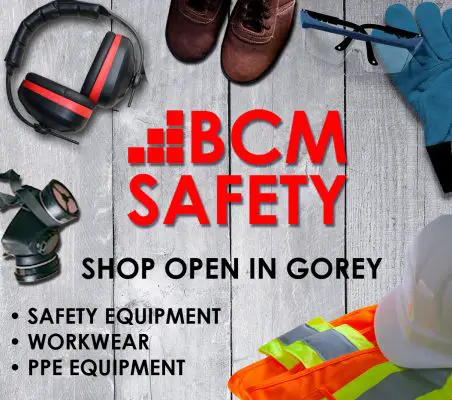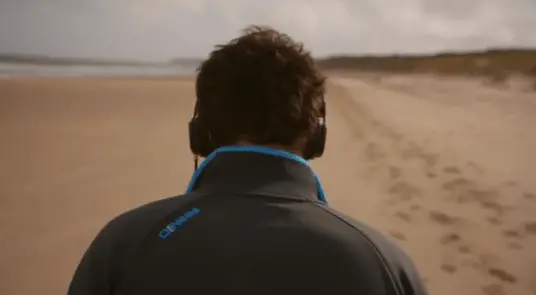Due to the Covid-19 outbreak, the Irish Government’s restrictions means that we have to stay at home unless otherwise necessary. They’re asking others to self-isolate or to cocoon and are aiming to create a society whereby social distancing becomes a temporary norm…

For most of us, these are unprecedented times. Some are struggling. They can’t see their loved ones and they are craving social interaction because that is human nature.
However, for Brian Scallan, a native of Broadway in County Wexford, some of the measures aren’t so new and they don’t take too much time getting used to again.
At this stage, he’s used to it all; socially isolating himself from others came with the condition he was diagnosed with in 2012. At first, he thought he was depressed, but a traumatic event in college would lead to his eventual diagnosis of Paranoid Schizophrenia aged just 18.
“This whole isolation thing isn’t new to me because for years, I’ve been isolated with my mental health. I wouldn’t leave the house, but that has got better over the years as I play hurling, soccer and work, even though it can be hard with my constant paranoia. Now all three have been taking away from me due to the virus and it is hard to fill the day.”
In the past, Brian has been public about his condition. Interviews with various news outlets, blog posts, and even a feature in an RTE documentary entitled ‘Schizophrenia: The Voices In My Head’ means Brian is associated and publicly identified with the condition. For Brian though, he doesn’t mind because he can see the bigger picture:
“I don’t mind because the way the media portray Paranoid Schizophrenics is that they are dangerous and violent. One of the reasons I did these interviews, blog posts and the RTÉ documentary was to show people that not everyone who has Paranoid Schizophrenia is violent. I agree some are, but others aren’t. Like I don’t have a criminal record whatsoever, not even a parking ticket so if by me doing all these interviews that gets across… that we are not all violent, it would be great.”
Pandemic or no pandemic, dealing with Paranoid Schizophrenia is far from easy. Little things like using the wrong phrase or word when talking to Brian annoys him. Phrases and words such as ‘certainly, of course, definitely, spot on, exactly, hmm, fair play, sorted, absolutely, perfect’, have had such a profound affect on him previously that it made him feel suicidal:
“There are only a few words, but every time I hear a word or phrase that I hate whether it be in public, on the TV or on the radio I genuinely get so depressed and angry. Even though I can’t show this in public, I also get suicidal because I hate them so much and have attempted suicide in the past over it. I can’t show my anger in public, but I do shout back at the TV and the radio. Once I hear these words or phrases, I genuinely believe that they are said on purpose just to depress me. And it works.”
For most people, watching TV is a pleasure. It’s entertainment and it often offers a medium for important discussion. It’s not as easy as just sitting back, relaxing, and enjoying it for Brian though. Take your favourite show you just love to binge-watch on Netflix, or a football match broadcasted live on RTÉ for example.
In the past, he discussed how panelists and commentators such as Johnny Giles or Eamonn Dunphy were speaking directly to him and that the panelists knew him, his face and everything about him, even the fact that he didn’t like certain phrases. Even though he’s aware that this belief may be irrational, today, he remains of the same opinion.
His family, his friends, and even mental health professionals have highlighted how this is simply impossible. However, with his condition, just telling him that ‘this isn’t possible’, simply isn’t enough:
“My reaction was and still is the same that everyone is lying to me – even mental health professionals when they say that it isn’t possible. I find it so disrespectful to lie to someone about their own health. Like, why lie to someone about their own health knowing they get so depressed and suicidal over it?”
While he understands that his condition is impacting him, he also understands how it has impacted others around him:
“This has huge impacts on my relationships with other people. I genuinely believe that they are all lying to me and that they don’t care. That is obviously going to make you feel so bad when you believe that no one cares about you. It’s very hard and extremely upsetting.”
There is hope for people like Brian though. Despite his condition, Brian is working with the help of an understanding boss, colleagues, and specifically, a Mental Health employment specialist. Work is another social outlet for Brian, but unfortunately due to the Coronavirus, that outlet has been stripped away from him for now.
He gives credit to the Mental Health specialist, while it also shows that the supports are there for people suffering with their Mental Health, that a ‘normal’ life can be lived, and that it can be dealt with if the appropriate measures are taken.
“I actually have a Mental Health employment specialist who is great in that she was able to go to the employer and tell them everything about my mental health and how it affects me. If it wasn’t for my employment specialist, I wouldn’t be working. She supports me an awful lot by checking in on me most days.”
With daily reports about the Coronavirus and with daily updates on how to manage it, the 27-year old is questioning why the same cannot be done for those suffering with Mental Health issues. The impact of news outlets reporting figures alone could prove beneficial. He believes a lot more should be done to raise awareness about the various Mental Health conditions and that this should no longer be a taboo subject.
For Brian, the message is simple. Although admittedly cliché, it’s remains a powerful and important one:
“I know it sounds cliché when it comes to Mental Health, but to just talk to someone. Anyone, even me…”
“I know it’s hard because I’ve been there, but you’re not weak if you speak. In fact, it makes you a stronger person because you’re willing to face up to your problems and to fix them.”
“I’m not fully right and I might never be. But if I didn’t speak up, I genuinely wouldn’t be here. I know I mentioned about my suicide attempts in the past and I know that’s sad and you might think how am I still feeling like this? But, if I didn’t speak out, I’d still be hallucinating, and I wouldn’t be socialising. I would still be hearing vicious voices… it is better than not speaking.”
For more information on Paranoid Schizeopherina, check out the HSE’s website here.
If you are struggling with Mental Health, the Irish helplines can be found below:
Samaritans: 116-123
Pieta House: 1800-247-247
Childline: 1800-66-66-66
Emergency: 999 or 112




